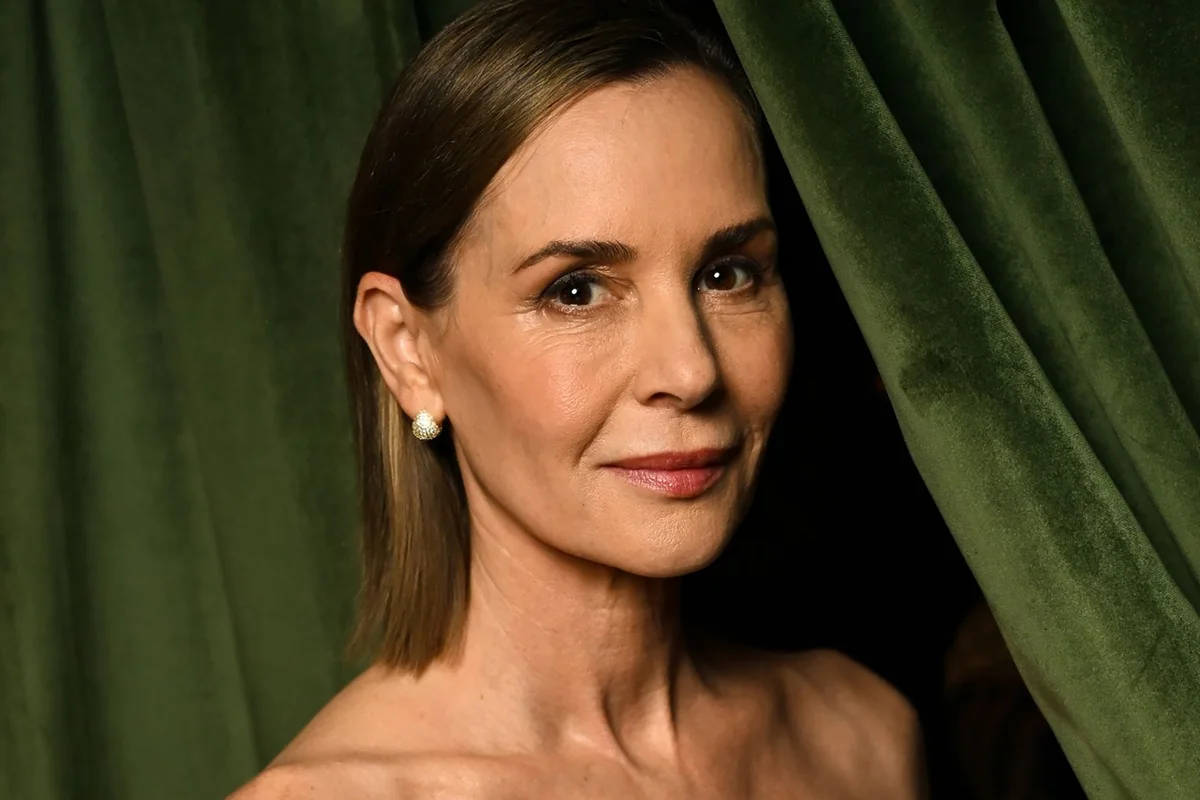Embeth Davidtz on Matilda, trauma and her haunting new film: ‘I was a child, so I absorbed the bigotry and violence around me’
By Adam White
Copyright independent

When she was eight years old, the actor Embeth Davidtz was pulled out of her home in New Jersey and flown with her South African parents to Pretoria, amid the particularly volatile years of the country’s apartheid system. It was 1974, and while Davidtz’s father took a job as a chemical engineering professor, the country itself was a powder keg, with the ruling white populace losing their power, and political unrest in the streets. “The world around me suddenly became very threatening,” Davidtz remembers. “You’d hear grown-ups talking about threats, about break-ins and standoffs. My parents weren’t outspokenly racist, but they didn’t address the elephant in the room. They didn’t say, ‘Look around you – this is wrong.’ So, because I was a child, I absorbed the fear, the bigotry and the casual violence around me.”
In her early twenties, Davidtz moved back to the US to pursue acting, and found fame as the terrified Jewish maid Helen in Steven Spielberg’s Schindler’s List, and later as the angelic school teacher Miss Honey in Danny DeVito’s Matilda. She would discuss South Africa in interviews, but rarely the specifics of what she witnessed, or the trauma it left behind in her. Or how her political awakening in university shaped her worldview. “One could imagine it like being a kid who grows up in a MAGA household today, and then going to a liberal arts college and having their mind blown,” she says. “You’re like… oh my God, this is the other side! This makes sense to me now!”
Flash forward to 2025, and the now 60-year-old Davidtz has made her writing and directing debut with a movie inspired by a story that could very well have been her own. Don’t Let’s Go to the Dogs Tonight – its mouthful of a title serves as a warning against unruliness – is adapted from a bestselling 2002 memoir by Alexandra Fuller. Davidtz fell in love with it on the page, and years before she pondered turning it into a film. It charts the build-up and aftermath of a Rhodesian election that proved pivotal for the country’s majority Black population, and is told through the eyes of the young Fuller, who is growing up in a world she doesn’t quite understand. Nicknamed Bobo, she parrots some of the racism of the adults around her, both consciously and unconsciously, while also developing a strong if queasy bond with one of her family’s Black servants. Davidtz has adapted Fuller’s story unflinchingly, allowing her quasi-hero (played by a remarkable seven-year-old named Lexi Venter) to be sharp, spirited and loveable – and then, in an instant, cruel and bigoted. It’s a delicate sleight of hand that Davidtz handles brilliantly.
When we connect over Zoom, Davidtz is at home in Los Angeles, her primary base since the Nineties. She sits regally at her office chair, earnest and plain-speaking. There’s an interesting lack of artifice to her. She likes uncomfortable themes, she tells me. She likes honesty and difficult conversations. She thinks it’s this temperament that has kept her largely outside the inner circle of Hollywood over the years, but it’s not something she’d change about herself. “Being around big stars, you notice a guardedness, and a very curated face that they put on,” she explains. “I’ve never been the smartest in terms of the business, but I do follow my instincts. I don’t like to hide or pretend.”
Getting Don’t Let’s Go to the Dogs Tonight financed, for instance, was made harder because Davidtz had no interest in watering down its uglier scenes. “Nobody in the States wanted to go near anything about race,” Davidtz says. “I was told I was stepping into really scary territory.” One producer told her she couldn’t help fund the film because of the “racial undertones” in the script. “I said to her, ‘Actually, these aren’t undertones but headlines.’ The film needed them. You make this child charming and lovely, and then you make her do something that is – on a human level – supremely disappointing. And if I toned it down, it wouldn’t have been an honest rendering of what existed. It is shocking, but I wanted it to be.”
Davidtz says she was in a period of “semi-retirement” when she decided to start work on the movie. She had bought the film rights to the book and initially imagined an adaptation as, she jokes, “a bit of a vanity project”. Fuller’s memoir spans decades of time and digs into her wider family, particularly her alcoholic and increasingly unwell mother. On paper, it was a perfect Davidtz role. “I thought, ‘Lovely! This will show my range!’” But as she worked on the script, she realised the film needed to be told largely through Bobo’s young perspective. Davidtz still plays the role of Bobo’s mother – and brings to it a wild, frenzied mix of menace and tragedy – but she is nowhere near as present in the film as she is in the source material.
Still, it’s a real showcase for an actor who has never particularly got her due – if only because I’m part of a generation that grew up thinking she was the most dazzling person on the planet. Along with practically every other child of the Nineties, I discovered Davidtz via Matilda, where she brought so much winsome magic to the role of Miss Honey that I’m not surprised when she tells me she’s endlessly asked about it. Today Miss Honey remains a symbol of found families, of mentorship, and the wonder of finally being seen by someone for who you really are.
“And she’s become a gay icon now!” Davidtz laughs. “For lots of young girls, especially.” She has theories as to why the character has endured. “I think we all have this idealised version of a mother, a teacher, a guardian or a friend when we’re young, and Miss Honey is just someone who would really protect you when the chips are down. If you’re neglected, she’d come and rescue you. If you’re realising that you’re gay and can’t tell anybody just yet, she would see you and understand you and accept you. She just came to represent something so much bigger than what we knew at the time.”
Schindler’s List and Matilda anointed Davidtz a rising star of the Nineties, but she doesn’t think she made smart professional choices overall. “I’m not even going to tell you the things I said no to back then,” she winces. “After Schindler’s I made Feast of July, a Merchant Ivory film with a great script – but absolutely nobody saw it.” Then, encouraged by her agents to make a big, expensive film, she made the treacly Robin Williams movie Bicentennial Man – “which was massive, but a huge flop”, she laughs. “I picked stuff that spoke to me, rather than listening to those clever agents saying, ‘Here, build a career this way.’”
Davidtz always worked, and often in some of the biggest films and television shows of the past three decades, but usually in small supporting roles: she was Colin Firth’s haughty love interest Natasha in Bridget Jones’s Diary, Peter Parker’s deceased mother in the Andrew Garfield Spider-Mans, and a woman stranded on the beach that makes you old in M Night Shyamalan’s nutty thriller, um, Old. She had a fantastic recurring role on Mad Men as the ruthless wife of Jared Harris’s doomed Lane Pryce, but a less-fantastic blink-and-you’ll-miss-her role as a lawyer in David Fincher’s The Girl with the Dragon Tattoo. “A lot of it is smoke and mirrors, or a studio telling you that if you do this small part now, it’ll become bigger in the sequel – but often that doesn’t pan out,” she says. “It’s always a bit of a gamble, but eventually taking that gamble got boring. I’d find I’d take the time to build a character, and then see it amount to nothing.”
There were other priorities, too. Davidtz raised a family – her children, with the entertainment lawyer Jason Sloane, are now aged 20 and 22 – and survived stage-3 breast cancer. One of her most memorable roles arrived just as she was recovering from an intensive course of chemotherapy, lymph-node-removal surgery and a double mastectomy. In the TV series Ray Donovan, she played a slippery art dealer, and the part required scenes of nudity. Before filming began, Davidtz told the show’s executive producer that only one of her breasts had, at that point, been reconstructed.
“I thought, OK, either we get a prosthetic and stick it on, or we could use the fact that I was a work in progress,” she remembers. The character was re-written to have experienced breast cancer herself, and Davidtz’s eventual nude scene broke new ground for depictions of cancer survival on screen. “I remember my agents at the time going, ‘Why would you do that?’ But it provided this image of a sexy, cool woman who is still capable of being sexy and cool even with a visible difference. It was just about using what you’ve got, and throwing spaghetti at the wall and seeing what sticks.”
Davidtz would be open to acting again, but her focus for now is behind the camera. She hadn’t planned on writing and directing Don’t Let’s Go to the Dogs Tonight, but circumstances led her to realise that no one else could tell Fuller’s story on screen as well as she could – not that she believed in herself at first.
“So often actors are compartmentalised, and told to know their place and stay there,” she says. “But through all of this I actually figured out that I do have something to say, and that I do know what I’m doing. When you direct something, it lives and dies by you. That is the scary part of it, but the thrilling part of it, too.”
‘Don’t Let’s Go to the Dogs Tonight’ is in cinemas from 3 October



